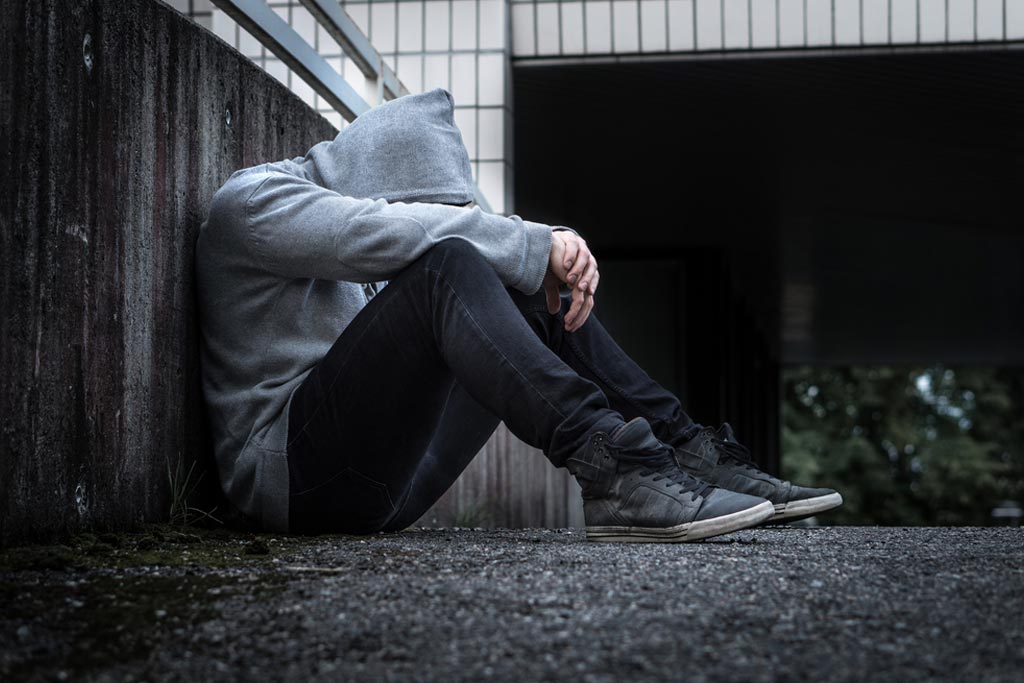Who’s Blue? Jack moves and talks slowly, sighing frequently. He has no complaints about his life other than a few marital spats, but neither does he have any enthusiasm for his work or home life. When asked if he’s happy, he says “I guess so; I’m getting by.”
Lauren cries easily and often, feels anxious and scared, and has trouble sleeping. She’s confused and frustrated with her boyfriend; she hates his criticism of her but feels intimidated and won’t leave him because she’s afraid of being alone.
Harry’s wife left him suddenly. He feels abandoned and alternates between rage and hopelessness. He continues to go to work but withdraws from friends and family and at times thinks of “ending it all”.
Jack, Lauren and Harry are among the 20% of Americans who are treated for depression every year. Their numbers are increasing, especially among people born since 1940;in a recent poll, 52% of the adults questioned admitted that they felt “lonely and depressed”. What is it? In practice, clinical depression tends to be defined by its symptoms, which include:
· Feelings of helplessness, hopelessness, worthlessness and anxiety
· Poor concentration, confusion, forgetfulness or indecisiveness
· Decreased ability to enjoy life
· Sleeplessness or constant fatigue
· Loss of appetite or overeating
· Unusually slow or rapid speech and physical movements.
Depressed people are pessimists. Expecting the worst from life, they magnify failures and minimize successes. They tend to blame themselves for anything that goes wrong, even events over which they have no control.
Many factors may contribute to depression, among them personality characteristics; chemical imbalances; genetic factors; learned patterns of behavior; stressful life events; social or economic class; age and gender.
Learned helplessness, stemming from a lack of control over life, creates chronic, low-level depression. When we believe we can’t control what happens to us and our actions repeatedly fail to produce desired results, we feel helpless and become depressed.
Repressed anger can become depression. Chronically depressed people are dependent upon love, approval, and reassurance from others because they lack self-esteem. Fearing that expressing their anger will drive away those they love, they often deny angry feelings, resulting in depression.
Reactive depressions occur in response to a loss of some kind. Job loss, divorce, retirement, empty nest or completion of a major life goal can trigger reactive depression. Depression may recur on the anniversary date of these events.
RESEARCH
HELPLESSNESS CAUSES DEPRESSION
Long recognized as a symptom of depression, an attitude of helplessness can also cause depression.
Experimental animals placed in boxes where they received inescapable electric shock soon gave up trying to escape. This helplessness persisted even when they were later placed in boxes where they could escape the shock. In contrast, animals that could control shocks did not become helpless.
Tests with humans revealed dramatic parallels between experimentally induced learned helplessness and major depressive symptoms. From these studies, researchers concluded that when our actions make no impact and produce no results, and when we attribute our failure to lack of ability, we feel depressed and perform poorly.
Vulnerability to helplessness is influenced by-
· Success or failure of previous attempts to control life.
· Passivity. People who consistently “let life happen to them” are at greater risk for feeling helpless than those who believe that they control their own destiny.
· Sex role. Research shows clear parallels between the way girls are raised and training for helplessness. One recent study suggests that strongly stereotyped sex roles in either sex increases susceptibility to learned helplessness.
· Low self-confidence. Seeing yourself as a “loser” and a failure fosters development of helplessness.
SEX DIFFERENCES
MEN, WOMEN AND DEPRESSION
It is estimated that 1 in 4 women and 1 in 10 men will experience a serious bout with depression at some point in their lives. Theories on why women experience more depression include:
Women experience depression differently than men. Depressed women report feelings of loneliness, helplessness, and despondency, and want external reassurance. Men report more depression due to self-criticism and the failure to live up to expectations. Mild depression in women is correlated with the number of visits to physicians; for men, it correlates with absenteeism from work.
Marriage seems to protect men against depression, but more married women are depressed than single women. Research consistently finds that married women are more depressed than married men, but widowed and never-married men are more depressed than their female counterparts.
Loss of an emotional attachment is the single most frequent cause of depression in women. Women tend to judge themselves by the quality of their relationships with others and hold themselves responsible when relationships do not go well. Too often, the failure of a relationship is equated with being a failure, and depression is the result.
Men and women may have different expectations about life. Men seem to expect that if all goes well, they won’t experience major unhappiness; women expect to be happy, leaving them open to greater disappointment and more vulnerable to depression.
TREATMENT
BEATING THE BLUES
80% of those suffering from depression can be helped. Psychotherapy (plus anti-depressant medication when appropriate) relieves depressive symptoms, keeps them from coming back, and helps clients function normally
Therapy for depression includes…
· Recognition of the negative and self-destructive thoughts and attitudes that both accompany and perpetuate depression.
· Replacement with more positive, optimistic attitudes.
· A positive relationship with a therapist who will not ” give up”, no matter how depressed the client becomes.
· Support and encouragement for taking control over your life.
Group therapy offers the added advantages of feedback and encouragement from other group members; a forum for learning and practicing interpersonal skills, and the nucleus of a support group that can be carried into clients’ daily lives.
YOU CAN HELP
If someone close to you is depressed…
· Listen without being judgmental
· Offer alternatives for dealing with practical problems
· Tell them you care about them
· Share daily activities such as meals, shopping or work tasks.
Avoid advising a depressed person to “cheer up” or “snap out of it”; these statements may be interpreted to mean that you think their depression is invalid, or a burden to you.
You can lend moral support by accompanying a depressed friend or family member on their first visit to the therapist. Your presence may be the extra push needed to take that important first step toward getting help.
CHILDHOOD DEPRESSION
KIDS GET BLUE, TOO
10%of children under the age of 12 suffer from depression. Because they can’t talk about their feelings as well as adults do, it can be more difficult to diagnose childhood depression.
Signs of depression in children include:
· Changes in sleeping/eating patterns
· School problems or refusal to go to school
· Unhappiness or talk of self-hatred
· Sadness lasting a week or longer
· Lack of enthusiasm for usual activity
· Any significant change in the child’s usual behavior.
· Preoccupation with death, or
· Talk of suicide.
PREVENTION
Don’t panic if your child is a little moody. While depression occurs more frequently in children than was once believed, it is not epidemic.
To help your child avoid depression or weather it successfully…
· Help your child like himself. Praise successes and provide extra help when needed.
· Be alert to changes in your child’s usual disposition, especially if they last more than a week.
· Don’t hide your feelings about family problems like divorce or illness.
· Encourage your child to talk about what bothers him. Ask specific questions and don’t tease if the cause seems trivial to you.
· Take any mention of suicide seriously. Get professional help for any child who talks about suicide.
Children imitate parents; depressed parents raise depressed children. If you yourself are suffering from depression, protect your child by promptly seeking professional help for yourself.
DON’T LET THE BLUES GET YOU DOWN
The quiet. Self-sufficient individual, who tends not to ask for help, has a higher risk for suicide from depression than those who reach out for support. Men who believe they should be emotionally self-sufficient are particularly at risk for successfully concealing their depression until suicide seems to be the only way out.
You don’t have to fight depression alone; willingness to seek outside help shows emotional maturity. Depressed people often start to feel better just from having taken action rather than remaining helpless. If you find yourself thinking about suicide, psychotherapy is imperative.
Depression can make even routine things seem enormous. If the task at hand seems overwhelming, break it into smaller steps that are easier to handle. Instead of looking at the task of getting a job for example, set a goal of making one phone call or typing one page of your resume.
Depression tends to isolate its victims. Push yourself to get involved in activities that include other people, even if it’s just going to a movie. You don’t have to be the life of the party; just get a little human contact.
If you’re depressed in reaction to a loss of any kind, respect your need to grieve and give yourself adequate time to do so. Don’t berate yourself, saying “I should be over that by now.” Trying to cut short your time of mourning will only add to the length of time it takes to recover.
Regular aerobic exercise that raises the heart rate for 20 minutes or more has anti-depressant effects. Walking, jogging, tennis, weight lifting, and other active exercise lift low spirits and also increase self-confidence.
Clinical depression can be brought about by certain physical illnesses and is associated with others. Illnesses known to cause depression include thyroid disorders, diabetes, some neurological disorders, multiple sclerosis and certain vitamin deficiencies. Others, such as hepatitis, influenza, anemia, endocrine problems, asthma, and many infectious diseases, are often associated with depression.
BLUE MONDAYS
DEPRESSION AND YOUR JOB
Depression affects job performance and career advancement as well as personal lives. Signs of on-the-job depression include lack of enthusiasm and initiative, dependency on others for direction, and lack of ambition.
The work environment itself can be depressing. Restrictive unsupportive job situations that offer little chance for advancement increase vulnerability of depression. Lack of recognition and rewards increase feelings of powerlessness and resentment that feed depression.
Smart employers actively support employees who seek help for depression. They know that the time and money spent on treatment will result in increased productivity and morale, and decreased employee turnover.
HOW BLUE ARE YOU?
The National Association for Mental Health defines depression as “an emotional state of dejection and sadness, ranging from mild discouragement and downheartedness to feelings of utter hopelessness and despair.” Normal low moods are separated from clinical depression by intensity, severity, and duration of these symptoms:
BLUE MOODS
Mild depressions are a normal reaction to disappointment. They can be triggered by business crises, problems at home, holidays, anniversaries of unhappy events, or even by the letdown that follows an exciting event. Episodes of the blues are usually brief and subside spontaneously.
BLUE FUNK
When feeling low becomes a lifestyle, we lose our zest for life and have difficulty doing daily tasks. A depressed mood that lasts longer than 2 weeks, interferes with daily living, or seems out of proportion to the situation indicates a need for therapy.DEEP BLUES
Symptoms of extreme depression may include emotional and physical withdrawal, insomnia, agitation, or brooding. We may distort what others say or do, feel rejected or unloved despite reassurance, or think or talk about suicide. Therapy is imperative in these situations.




